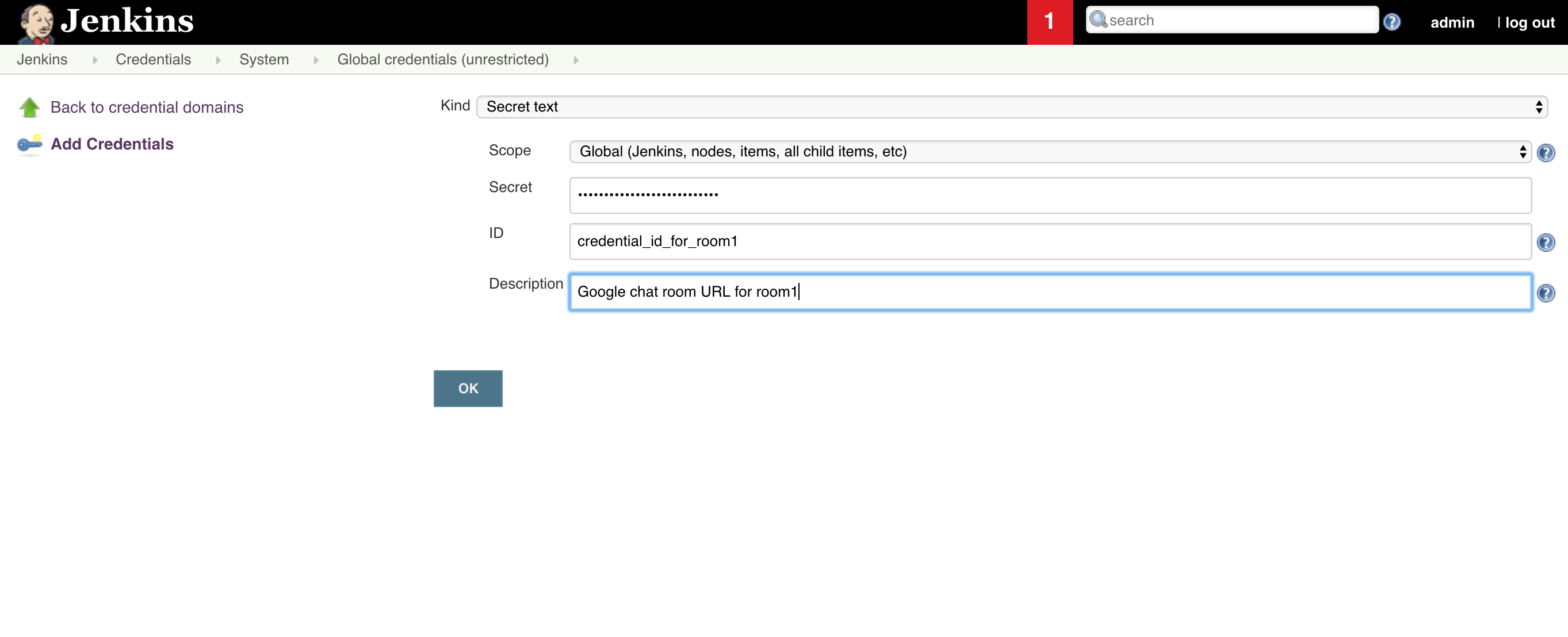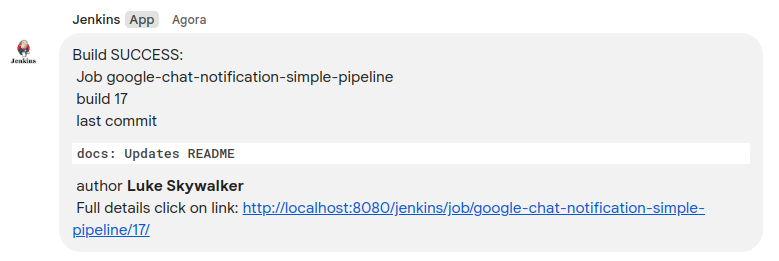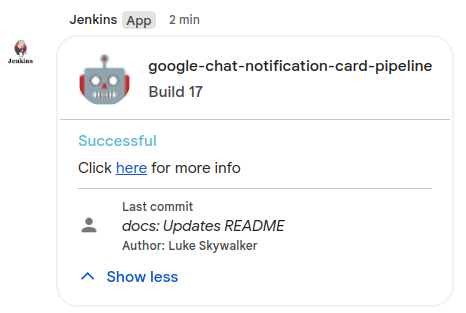Google Chat Notification Jenkins Plugin to send build status to Google Chat.
This Jenkins plugin allows you to send Google Chat notification as a post build action or as a pipeline script.
-
Create a webhook in Google Chat Space to send notifications
-
Install this plugin on your Jenkins server:
- From the Jenkins homepage navigate to
Manage Jenkins - Navigate to
Manage Plugins, - Change the tab to
Available, - Search for
google-chat-notification, - Check the box next to install.
- From the Jenkins homepage navigate to
googlechatnotification url: 'web hook(s) URL(s)', message: 'message to be sent'
googlechatnotification url: 'web hook(s) URL(s)', message: 'message to be sent', messageFormat: 'simple|card', sameThreadNotification: 'true', threadKey: '', notifyAborted: 'true', notifyFailure: 'true', notifyNotBuilt: 'true', notifySuccess: 'true', notifyUnstable: 'true', notifyBackToNormal: 'true', notifySingleFailure: 'false', notifyRepeatedFailure: 'false', suppressInfoLoggers: 'true'
-
url
-
This is a mandatory String parameter.
-
Single/multiple comma separated HTTP URLs or/and single/multiple comma separated Credential IDs.
- To use Credential ID as URL identifier configure entire URL as secret in credential. Use id:credential_id_for_room1 as value in URL.
-
Different Sample Ways to define URL parameter:
- https://chat.googleapis.com/v1/spaces/room_id/messages?key=key_id&token=token_id
- https://chat.googleapis.com/v1/spaces/room_id/messages?key=key_id&token=token_id, https://chat.googleapis.com/v1/spaces/room_id2/messages?key=key_id2&token=token_id2
- id:credential_id_for_room1
- id:credential_id_for_room1, id:credential_id_for_room2
- https://chat.googleapis.com/v1/spaces/room_id/messages?key=key_id&token=token_id, id:credential_id_for_room2
- https://chat.googleapis.com/v1/spaces/room_id/messages?key=key_id&token=token_id
-
-
message
- This is a mandatory String parameter.
- Notification message to be sent.
- Supports all token macro variables for pipeline as well as build jobs.
-
messageFormat
- This is an optional String parameter.
- The format of the message sent. Default value is
simple. - If
cardis provided as value, the parametermessagemust be a valid JSON configuration for card message.
-
sameThreadNotification
- This is an optional boolean parameter. Default value is false.
- This parameter is used to send notification in same thread for a particular job. If false, the default behavior is to create a new thread for each message.
- If messageFormat is set to
cardand the provided JSON contains a 'thread' key, this parameter will be ignored.
-
threadKey
- This is an optional String parameter. Default value is null.
- The thread used to send all the generated notification messages for a particular job. If not defined, the default behavior is to use the
JOB_NAMEas threadKey. - Supports all token macro variables for pipeline as well as build jobs.
- This parameter only applies if sameThreadNotification is set to true.
- If messageFormat is set to
cardand the provided JSON contains a 'thread' key, this parameter will be ignored.
-
notifyAborted
- This is an optional boolean parameter. Default value is false.
- Notification message to be sent when build status is ABORTED.
-
notifyFailure
- This is an optional boolean parameter. Default value is false.
- Notification message to be sent when build status is FAILURE.
-
notifyNotBuilt
- This is an optional boolean parameter. Default value is false.
- Notification message to be sent when build status is NOT_BUILT.
-
notifySuccess
- This is an optional boolean parameter. Default value is false.
- Notification message to be sent when build status is SUCCESS.
-
notifyUnstable
- This is an optional boolean parameter. Default value is false.
- Notification message to be sent when build status is UNSTABLE.
-
notifyBackToNormal
- This is an optional boolean parameter. Default value is false.
- Notification message to be sent when build status is SUCCESS and previous build status was not SUCCESS.
-
notifySingleFailure
- This is an optional boolean parameter. Default value is false.
- Notification message to be sent when build status is FAILURE and only on single failed build.
-
notifyRepeatedFailure
- This is an optional boolean parameter. Default value is false.
- Notification message to be sent when build status is FAILURE and only on repeated failures.
-
suppressInfoLoggers
- This is an optional boolean parameter. Default value is false.
- Suppress all info loggers in Jenkins build.
Default behaviour of plugin is to send notifications for all build status unless overridden with true value for above defined build statuses.
You can expose Git commit info in your pipeline with something like this:
environment {
GIT_LAST_AUTHOR = sh(script: 'git --no-pager show -s --format=\'%an\' $GIT_COMMIT', returnStdout: true).trim()
GIT_LAST_COMMIT = sh(script: 'git log -1 --pretty=\'%B\'', returnStdout: true).trim()
}
googlechatnotification url: 'web hook(s) URL(s)',
message: "${env.JOB_NAME} : Build #${env.BUILD_NUMBER} - ${currentBuild.currentResult}: Check output at ${env.BUILD_URL}"
googlechatnotification url: 'web hook(s) URL(s)',
message: "Build ${currentBuild.currentResult}:\n Job ${env.JOB_NAME}\n build ${env.BUILD_NUMBER}\n last commit ```${env.GIT_LAST_COMMIT}```\n author *${env.GIT_LAST_AUTHOR}*\n Full details click on link: ${env.BUILD_URL}"
Includes the last Git commit author and text in the notification only when the build result is UNTABLE or worse
String buildResult = currentBuild.currentResult
String buildDetails = currentBuild.resultIsWorseOrEqualTo("UNSTABLE")
? "\nLast commit author: *${env.GIT_LAST_AUTHOR}*\n ```${env.GIT_LAST_COMMIT}```"
: '';
googlechatnotification url: 'web hook(s) URL(s)',
message: "*${env.JOB_NAME}* - Build ${env.BUILD_ID} (<${env.BUILD_URL}|Details>) ${currentBuild.description} ${buildDetails}"
String buildResult = currentBuild.currentResult
def statusIcons = [SUCCESS: '\\u2714', UNSTABLE: '\\u26a0', FAILURE: '\\u274c']
def colors = [SUCCESS: '#5DBCD2', UNSTABLE: '#aca620', FAILURE: '#ff0000']
def buildStatusIcon = statusIcons[buildResult] ?: '\\u1F648'
def buildStatusWithColor = "<font color=\"${colors[buildResult] ?: ''}\">${currentBuild.currentResult}</font>"
googlechatnotification url: 'web hook(s) URL(s)',
message: "${buildStatusIcon} ${buildStatusWithColor}: *${env.JOB_NAME}* - Build ${env.BUILD_ID} (<${env.BUILD_URL}|Details>)"
google-chat-build-notification.json
{
"cardsV2":[
{
"cardId":"unique-card-id",
"card":{
"header":{
"title":"${JOB_NAME}",
"subtitle":"Build ${BUILD_ID}",
"imageUrl":"https://developers.google.com/chat/images/quickstart-app-avatar.png",
"imageType":"CIRCLE"
},
"sections":[
{
"header":"${BUILD_STATUS}",
"collapsible":true,
"uncollapsibleWidgetsCount":1,
"widgets":[
{
"textParagraph":{
"text":"Click <a href=\"${BUILD_URL}\">here</a> for more info"
}
},
{
"divider":{}
},
{
"decoratedText":{
"icon":{
"knownIcon":"PERSON"
},
"topLabel":"Last commit",
"text":"<i>${GIT_LAST_COMMIT}</i>",
"bottomLabel":"Author: ${GIT_LAST_AUTHOR}"
}
}
]
}
]
}
}
]
}
See Format a card message for instructions on how to format text in a card message.
- You may use Pipeline Utility Steps to read a JSON file in the workspace.
- You may use Config File Provider to copy a JSON file stored globally in Jenkins.
Pipeline
// read from workspace
def cardConfig = readJSON file: 'google-chat-build-notification.json'
googlechatnotification url: 'web hook(s) URL(s)', messageFormat: 'card', message: cardConfig.toString()
// read from global config file
configFileProvider([configFile(fileId: '9d792a84-6224-4529-aa30-2296e97df64e', targetLocation: 'google-chat-build-notification.json')]) {
def cardConfig = readJSON file: 'google-chat-build-notification.json'
googlechatnotification url: 'web hook(s) URL(s)', messageFormat: 'card', message: cardConfig.toString()
}
- Configure it in your Jenkins job (and optionally as global configuration) and add it as a Post-build action.
Use the syntax <users/{GOOGLE_CHAT_USER_ID}> in a message to mention users directly. See Google Chat User ID for tips on how to obtain a User ID.
When testing the connection, you may see errors like:
WARNING j.p.googlechat.StandardGoogleChatService#publish: Invalid Google Chat Notification URL found: xxx
There's a couple of things to try:
Add a log recorder for the StandardGoogleChatService class this should give you additional details on what's going on.
If you still can't figure it out please raise an issue with as much information as possible about your config and any relevant logs.
Install Maven and JDK.
$ mvn -version | grep -v home
Apache Maven 3.3.9 (bb52d8502b132ec0a5a3f4c09453c07478323dc5; 2015-11-10T08:41:47-08:00)
Java version: 1.7.0_79, vendor: Oracle Corporation
Default locale: en_US, platform encoding: UTF-8
OS name: "linux", version: "4.4.0-65-generic", arch: "amd64", family: "unix"
Run build and create an HPI file to install in Jenkins (HPI file will be in target/google-chat-notification.hpi).
mvn clean verify
Please report issues and enhancements through the Jenkins issue tracker.









